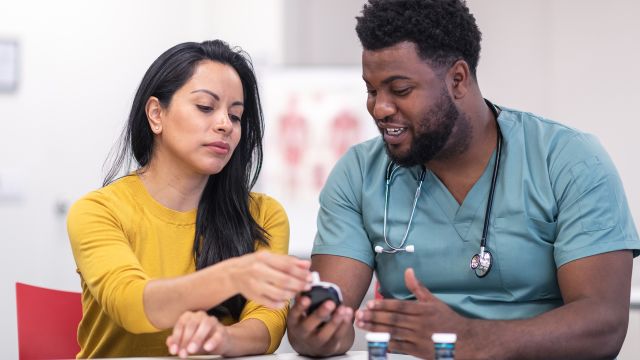If you have diabetes, you may have experienced hypoglycemia, which can occur if your blood sugar levels suddenly drop too low. The level of what is considered too low can vary from person to person, but it's usually below 70 mg/dL (milligrams per deciliter).
Hypoglycemia can come on quickly. You may feel shaky and hungry, start sweating, or get a headache. It can cause you to feel confused and disoriented and become lightheaded. For mild cases of hypoglycemia, eating a small meal of carbohydrates can restore your blood sugar to normal levels. In severe cases, however, you may be unable to take care of yourself and need help from others.
Who gets hypoglycemia?
Although hypoglycemia is more common in type 1 diabetes, it can occur in anyone with diabetes. In addition to uncomfortable and potentially dangerous physical symptoms, hypoglycemia can have serious consequences if it occurs at the wrong time.
You might fall or have a car accident when your blood sugar suddenly drops too low. Left untreated, a severe case of hypoglycemia can cause seizures, brain damage, coma (unconscious and unable to wake up or respond to outside stimulation), and even death. It’s important to recognize the symptoms of hypoglycemia and to take steps to prevent it.
Preventing hypoglycemia
Here are some steps you can take to help prevent hypoglycemia:
Know your numbers
Ask your healthcare provider (HCP) what blood sugar level is too low for you and what you can do to keep it in a safe range. For most people, blood sugar levels should be between 80 and 130 mg/dL before meals and less than 180 mg/dL two hours after starting to eat. Adhering to a comprehensive diabetes management plan—including taking your medications as scheduled—will help you control your blood sugar levels and prevent hypoglycemia.
Some types of insulin work fast, then peak and wear off. Others have a delayed onset but last longer and lower your blood sugar more evenly. For this reason, it's important to work with your HCP on developing a regimen that works best for you given the details of your condition, and adjusting that plan as needed.
Think holistically
It's important to coordinate when you eat, when you take your medications, and when you engage in physical activity. Carbohydrates in your food break down into glucose (sugar). If you don’t eat enough to match your medications, or you exercise more than usual, you could develop hypoglycemia.
Different diabetes medications have different peaks and durations in their effectiveness. It's therefore important to time your eating to coincide with these. If you don't do so, you may put yourself at risk of not having enough medication in your body when you eat, resulting in hyperglycemia (high blood sugar), or too much medicine when you haven’t eaten, resulting in hypoglycemia (low blood sugar).
Have a plan and stick with it
It's important for anyone taking insulin or oral diabetes medications to be very consistent with their eating schedule, particularly if they are on an intensive blood sugar control regimen. And it's crucial to have a plan that you develop with your HCP about what to do if you end up missing a scheduled meal or snack.
Remember also to limit your alcohol consumption and always eat if you do have a drink. Alcohol makes it more difficult to maintain consistent blood sugar levels and can prevent you from recognizing the signs of hypoglycemia.
If you’re prone to hypoglycemia, ask your HCP if it makes sense to carry a glucagon kit with you, and how insurance covers it. Glucagon is an injectable hormone that triggers your liver to release stored glucose into your bloodstream. If you have a severe episode of hypoglycemia, you will need someone close by to inject it into your buttock, arm, or thigh. Train family and co-workers how to administer glucagon.
What should you do if you do experience hypoglycemia? Eat or drink 15 grams of simple carbohydrates right away and recheck your blood sugar in 15 minutes. If it’s still too low, repeat these steps until it stabilizes. Fifteen grams of carbohydrates is about four ounces of a sweetened beverage, one tablespoon of sweetener, two tablespoons of raisins, or four glucose tablets. If you have diabetes, you should always carry carbohydrate-heavy snacks with you.
Remember, too, not to overdo it. It is possible to overtreat hypoglycemia.
Guard against hypoglycemic unawareness
One of the most dangerous conditions related to hypoglycemia is hypoglycemic unawareness (HU). This happens when someone has hypoglycemia but doesn't experience the typical early symptoms that would alert them to it. This can be particularly dangerous, because if you don’t realize your blood sugar levels are excessively low in time to correct them, you may have severe reactions, such as losing consciousness or having a seizure.
People at high risk of HU include those who have had diabetes for a long time, who frequently have low blood sugar episodes, or who tighly manage their diabetes (which means getting blood sugar levels as close as possible to the blood sugar levels of someone without diabetes). Others at high risk include older adults or people who have consumed large amounts of alcohol.
People who are at higher risk of HU should be aware of it, and tell their friends and family members about it so they can remain vigilant.






